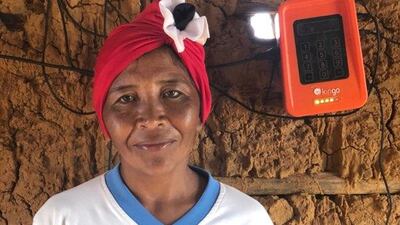A dozen growth-stage ventures are improving access to quality healthcare, clean energy and waste management in developing countries, according to the United Nations Development Programme (UNDP).
The UNDP, along with partners École Polytechnique fédérale de Lausanne (EPFL), telecoms giant Orange and technology firm SAP, selected the 12 finalists for the Growth-Stage Impact Ventures (GSIV) for Sustainable Development Goals initiative.
The initiative aims to identify and showcase mid-cap impact ventures in developing countries with the "catalytic potential" to drive large impact and yield sustainable profit, the UN agency said in a statement.
The 12 finalists represent $48 million in investment opportunities, impact the lives of 1.24m people in need and serve 22,300 businesses, Alessandra Rojas, sustainable entrepreneurship manager at EPFL Tech4Impact, said.
"The quality of the pipeline was exceptional, with ventures from the Global South presenting solid business models and impact track records," Ms Rojas said. "This edition was highly successful as we received almost twice the amount of nominations we did last year, which also shows the appetite from the investment community to share deals."
Energy
Within the energy category, there were four finalists. Iluméxico from Mexico city provides energy access to more than 106,000 users living in off-grid communities throughout Mexico and Colombia.
Kingo from Guatemala provides a prepaid solar energy service to low-income communities.
Easy Solar from Sierra Leone offers financing for solar-powered lighting and appliances to households and entrepreneurs. Powerstove from Nigeria develops affordable and sustainable energy solutions to meet the energy demand from households in Sub-Saharan Africa.
Healthcare
Among the finalists in the healthcare sector are South Africa's medical referral and communications firm Vula Mobile and Argentina's teleradiology company Mamotest. Brazil's Livox uses AI communication tools to empower people with disabilities and India's Bempu provides technologies that help newborns survive in low and middle-income countries.
Waste Management
The waste management finalists include India's Garv Toilets, Peru's Sinba, Nigeria's Cold Hubs and India's Saathi.
Among the criteria for accepting the growth-stage ventures was raising at least $500,000 and providing products or services for low-income people which reduce inequalities, especially gender disparities, through better access to quality health, affordable and clean energy, and by reducing waste.
Only ventures nominated by third parties — such as accelerators, impact funds, family offices and international organisations — who had headquarters, primary workforce, and provided services or established a product market in developing countries were eligible for the selection.
Out of the 12 finalists, seven have more than 50 per cent of women in C-suite positions and all-but one employ between 11 and 100 people.
"We strongly believe in the value of our selection process. We have the capacity to screen a gold mine of innovators that are shaping the new economy in developing countries," Sarah Bel, UNDP's SDG Finance Geneva Summit manager, said. "The pipeline we built is a great avenue to redirect large amounts of capital towards transformational impact investing."
The 2019 GSIV ventures increased their annual revenues by 39 per cent in 2020, despite the Covid-19 crisis, Ms Bel said. And 50 per cent of them raised at least one equity round in 2020, up to $5m, she added.
On June 3, the finalists are scheduled to pitch their business models then attend the SDG Finance Geneva Summit in late November, according to the UNDP.
The GSIV selection takes place as part of the UNDP SDG Finance Geneva Summit. The aim of the summit is to promote SDG-aligned investments, showcasing emerging market businesses that do well by doing good.
By bringing together a group of development professionals, investors, development finance institutions, academia and entrepreneurs, UNDP aims to catalyse a shift of capital from mainstream finance to impact investing with a focus on addressing SDGs, the UN agency said.


